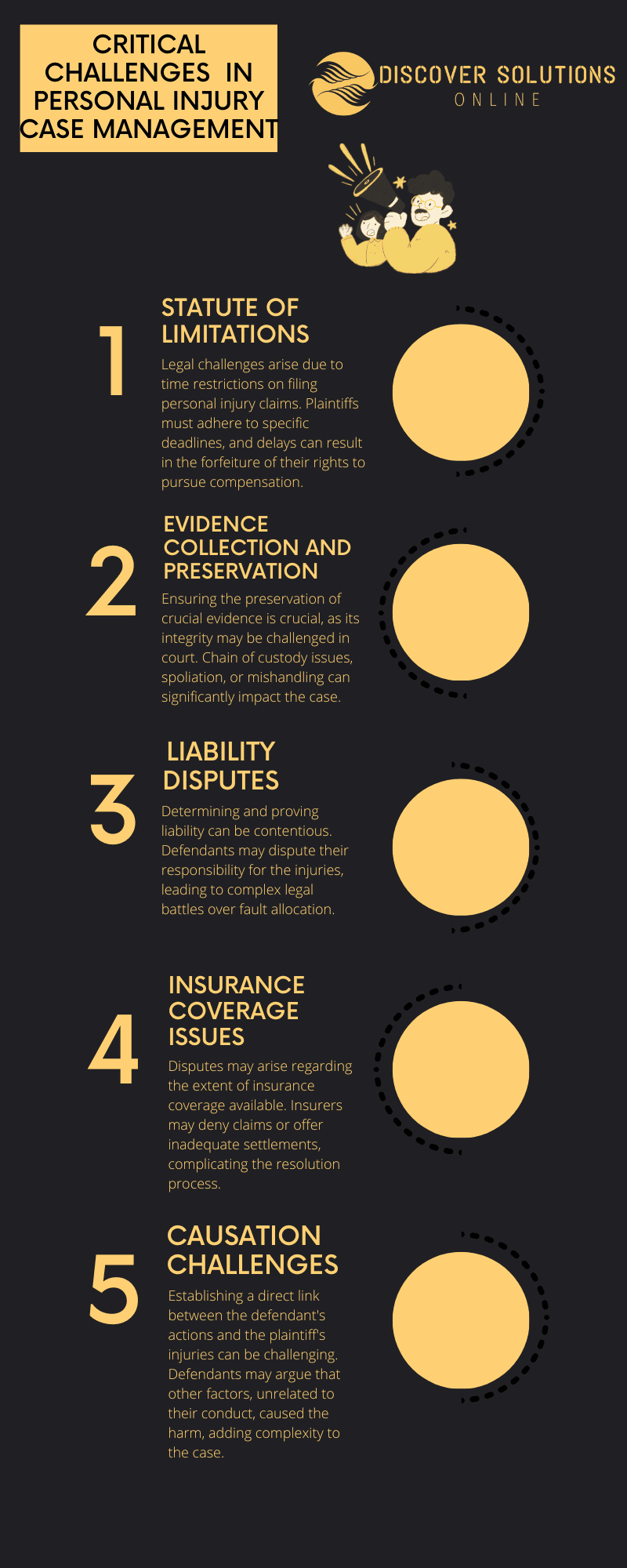Personal Injury Case Management is an essential aspect of the legal process for individuals who have suffered harm due to the negligence or wrongdoing of others. It involves overseeing and coordinating various aspects of a case, from initial intake and client communication to medical record review, evidence gathering, and settlement negotiations. Case management plays a crucial role in ensuring that clients receive the necessary support, resources, and representation to maximize their compensation and achieve a favorable outcome. Effective case management helps streamline the legal process, protect clients’ rights, and deliver optimal results in Personal Injury claims.
Organizing and Maintaining Important Documentation
One of the crucial elements that can significantly impact the outcome of a case is the organized and meticulous handling of documentation. From medical records to accident reports, preserving and managing key documents not only streamlines the legal process but also enhances the overall effectiveness of the case. In this section, we delve into the importance of organizing and maintaining vital documentation in Personal Injury cases.
Establishing a Clear Timeline
The foundation of a strong Personal Injury case lies in the ability to establish a clear and coherent timeline of events. Organizing documentation chronologically allows legal professionals to understand the sequence of events leading up to the injury, the incident itself, and its aftermath. This timeline becomes a powerful tool in presenting a compelling narrative in court, helping judges and juries comprehend the unfolding of events with clarity.
Ensuring Accuracy and Completeness
Accurate and complete documentation is paramount in Personal Injury cases. This encompasses medical records, police reports, witness statements, and any other relevant documents. By meticulously organizing these materials, legal teams can ensure that no crucial detail is overlooked. This attention to detail not only strengthens the case but also minimizes the risk of inaccuracies that could be exploited by opposing parties.
Facilitating Effective Communication
Personal Injury cases often involve multiple parties, including medical professionals, insurance companies, and legal representatives. An organized documentation system facilitates effective communication among these entities. Attorneys can readily access and share pertinent information, ensuring that all stakeholders are on the same page. This not only expedites the legal process but also fosters collaboration among professionals involved in the case.
Demonstrating Damages and Losses
Thorough documentation is instrumental in quantifying and demonstrating the extent of damages and losses suffered by the injured party. This includes medical bills, rehabilitation costs, lost wages, and any other expenses incurred due to the injury. By presenting a comprehensive record of these damages, legal teams can build a persuasive case for compensation, providing a solid foundation for negotiations or courtroom proceedings.
Compliance with Legal Requirements
Organizing and maintaining important documentation ensures compliance with legal requirements and standards. Failure to adhere to procedural guidelines or missing crucial documents can jeopardize the case. By staying organized, legal professionals demonstrate diligence and professionalism, contributing to the credibility of their case.
Streamlining the Discovery Process
During the discovery phase of a Personal Injury case, each party is required to share relevant information with the opposing side. An organized documentation system simplifies this process, allowing for the efficient exchange of information. This not only expedites the legal proceedings but also promotes transparency, as both parties can access the necessary documents without unnecessary delays.
In conclusion, the meticulous organization and maintenance of crucial documentation emerge as a linchpin for success. From establishing a clear timeline to demonstrating damages and ensuring legal compliance, a well-organized documentation system significantly enhances the efficacy of Personal Injury case management. Legal professionals who prioritize this aspect contribute not only to the efficiency of their own processes but also to the overall pursuit of justice for the injured parties they represent.

The Crucial Role of Tracking Deadlines and Important Dates
In the intricate world of Personal Injury law, where every detail can make or break a case, effective case management becomes paramount. Among the myriad responsibilities that legal professionals shoulder, tracking deadlines and important dates stands out as a linchpin in ensuring a smooth and successful resolution for Personal Injury cases. This critical aspect of case management not only streamlines the legal process but also safeguards the interests of all parties involved.
The Legal Tapestry: A Tangle of Deadlines
Personal Injury cases are governed by a multitude of legal deadlines and procedural requirements. Missing a crucial deadline can have severe consequences, ranging from the rejection of filings to the dismissal of an entire case. Attorneys, therefore, must meticulously track timelines for filing complaints, serving notices, responding to motions, and various other procedural steps. Failure to meet these deadlines can result in the loss of valuable rights and opportunities for the injured party.
Preserving Evidence and Witness Testimonies
One of the earliest and most crucial aspects of a Personal Injury case is the preservation of evidence. Timely identification, collection, and documentation of evidence play a pivotal role in building a strong case. Tracking deadlines ensures that attorneys act promptly to secure evidence such as accident reports, medical records, and witness statements. This not only strengthens the client’s position but also prevents potential spoliation issues that could adversely impact the case.
Negotiation and Settlement Opportunities
Negotiations and settlement discussions are commonplace. Timely communication and adherence to negotiation deadlines can significantly impact the outcome of these discussions. Missing a settlement conference or failing to respond to settlement offers within the stipulated time frame can lead to missed opportunities for resolving the case amicably. Effective tracking of negotiation deadlines enables attorneys to engage in meaningful discussions and, when appropriate, secure favorable settlements for their clients.
Court Procedures and Hearings
Navigating the court system involves adherence to a series of hearings, conferences, and procedural requirements. Failing to track and meet these deadlines can result in court-imposed sanctions or, in extreme cases, the dismissal of the case. Attorneys must stay vigilant in monitoring court-imposed timelines for discovery, motions, and trial preparation to ensure that their clients’ interests are adequately represented in the legal arena.
Client Communication and Expectation Management
Transparent and effective communication with clients is a cornerstone of successful Personal Injury case management. Regular updates and clear explanations of upcoming deadlines help manage client expectations and alleviate anxieties. Attorneys who excel in tracking deadlines can provide clients with a sense of confidence and assurance, reinforcing the trust between attorney and client throughout the legal process.
In conclusion, tracking of deadlines and important dates is the backbone of effective Personal Injury case management. It not only safeguards the legal rights of the injured party but also enhances the efficiency and credibility of legal professionals as Personal Injury cases often involve complex legal landscapes, a proactive approach to deadline tracking is not just beneficial—it’s indispensable. Attorneys who master this aspect of case management pave the way for a more streamlined, successful, and client-focused legal practice.
The Importance of Maintaining a Detailed Personal Journal
Documentation plays a pivotal role in ensuring a fair and just resolution for the parties involved. One indispensable tool in this process is the maintenance of a detailed personal journal. This practice not only serves as a therapeutic outlet for individuals navigating the complexities of a Personal Injury case but also proves to be an invaluable asset in building a strong legal strategy. In this section, we delve into the reasons why maintaining a detailed personal journal is crucial in the overall management of a Personal Injury case.
Memory Preservation and Accuracy
The aftermath of an injury can be a tumultuous and emotionally charged time. Memories tend to fade, and details become blurred over time. By keeping a detailed personal journal, individuals can capture the immediate aftermath of the incident with precision. This includes the sequence of events leading up to the accident, the emotions experienced, and any immediate physical or psychological impact. This information, recorded close to the incident, serves as a reliable reference point, ensuring accuracy when recalling crucial details during legal proceedings.
Emotional Well-being and Coping
The emotional toll of a Personal Injury can be overwhelming, and dealing with the aftermath often involves a rollercoaster of emotions. Maintaining a personal journal provides an outlet for individuals to express their feelings, fears, and frustrations. This therapeutic exercise not only aids in emotional healing but also allows legal professionals to understand the psychological impact of the injury, strengthening the case by providing a comprehensive view of the individual’s experience.
Chronological Documentation of Recovery
A Personal Injury case extends beyond the incident itself; it encompasses the entire journey of recovery. A detailed journal allows individuals to chronicle their medical treatments, rehabilitation exercises, and any setbacks encountered during the healing process. This comprehensive documentation serves as a roadmap for legal professionals, enabling them to present a clear narrative of the impact the injury has had on the individual’s life.
Demonstrating the Impact on Daily Life
Beyond medical records and expert testimony, a personal journal offers a firsthand account of how the injury has affected the individual’s daily life. From challenges in performing routine tasks to disruptions in personal and professional relationships, these insights provide a more holistic understanding of the impact of the injury. This firsthand account can significantly strengthen the case by humanizing the individual and highlighting the true extent of their suffering.
Legal Strategy and Preparation
A well-documented personal journal serves as a valuable resource for legal professionals in crafting a compelling narrative for the case. It helps in identifying key points, corroborating evidence, and anticipating challenges that may arise during the legal proceedings. By presenting a thorough and accurate account of the incident and its aftermath, individuals can empower their legal team to build a robust case that stands up to scrutiny.
In conclusion, maintaining a detailed personal journal is an essential aspect of Personal Injury case management. It not only aids in preserving accurate memories, promoting emotional well-being, and documenting the recovery process but also contributes significantly to the development of a strong legal strategy. As individuals navigate the challenging terrain of a Personal Injury case, a personal journal emerges as a powerful tool, ensuring their voice is heard and their story is told with the depth and authenticity it deserves.
How Discover Solutions Online Helps
Unveiling Clarity Through Chronological Precision
At Discover Solutions Online, we specialize in efficiently organizing documentation for Personal Injury cases. Our approach involves meticulous organization of information chronologically, detailing the sequence of events leading up to the injury, the incident itself, and its aftermath. Through our services, individuals can create a structured and comprehensive chronological account of their experiences. This well-organized timeline becomes a powerful tool for legal professionals involved in personal injury cases. By presenting a clear and coherent narrative, our documentation services assist judges and juries in comprehending the events surrounding the injury with precision. Discover Solutions Online’s dedicated efforts in organizing documentation contribute to the development of a compelling and accurate portrayal of the case, ensuring that the legal process is well-informed and just.





